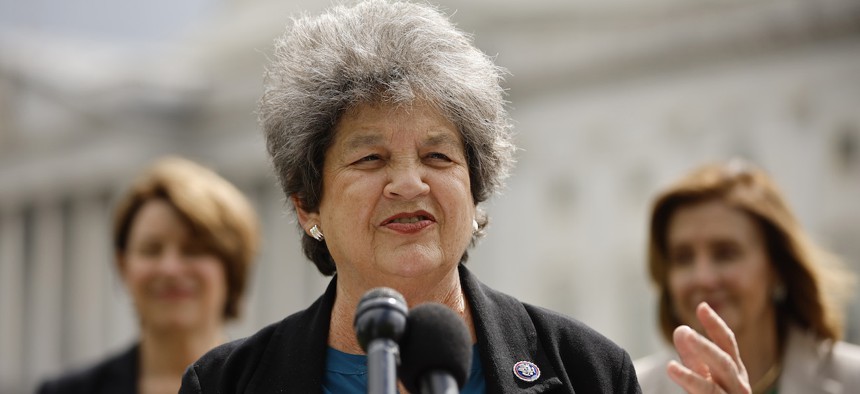
Rep. Lois Frankel speaks in Washington in May 2022. Chip Somodevilla/Getty Images)
House Democratic Women Make a Case Against Cuts to Programs for Women and Families
Members of the House Democratic Women’s Caucus are ‘gearing up for really big fights’ over funding for women’s health as House Republicans plan to propose slashing many areas of federal spending.
Originally published by The 19th
The House Democratic Women’s Caucus is stepping into the brewing battle over the federal budget and GOP plans to propose steep funding cuts, asking leaders of the House Appropriations Committee to prioritize funding for federal programs focused on women and families.
“I'm gearing up for really big fights in the area of women's health, because that's where we expect really harmful, draconian cuts,” Rep. Lois Frankel of Florida, chair of the Democratic Women’s Caucus, said in an interview Wednesday, citing potential cuts to family planning services including Title X and funds to organizations like Planned Parenthood.
In a Thursday morning letter shared first with The 19th, the caucus asks House Appropriations Chair, Rep. Kay Granger, a Republican, and Rep. Rosa DeLauro, the panel’s ranking Democrat, to “especially consider the impact this process has on women and girls across the United States of America.”
“We do not believe these should be partisan issues; rather, these are investments that will make our economy and our communities thrive,” said the Democrats’ letter. It was signed by Frankel, policy task force co-chairs Reps. Ayanna Pressley and Kathy Manning, vice chairs Reps. Teresa Leger Fernández and Nikema Williams, and chief whip Rep. Lucy McBath.
The caucus specifically asked Granger and DeLauro to preserve and expand funding for programs bolstering women’s economic security and health care access, combating violence against women, supporting women service members, and investing in the security and economic prospects of women and girls abroad.
But their requests run against a highly contentious budget process threatening deep cuts. Some House Republicans, who won back the majority in the 2022 midterms, said they intend to propose a plan to balance the federal budget in a decade without touching defense spending or entitlements like Social Security and Medicare, requiring drastic cuts to virtually every other area of federal spending. The effort stems from the concessions House Speaker Kevin McCarthy reportedly made with hardline members of his caucus to win the speakership.
Republicans also plan to leverage their demands for spending cuts in exchange for voting to raise the United States’ debt ceiling, setting up a high-stakes, bruising battle in Congress over the next several months.
House GOP leaders have not yet released their official budget plan to counter President Joe Biden’s $6.8 trillion proposal, leaving the various factions within the House GOP caucus to develop their own budget proposals and attempt to influence the process from behind the scenes, Axios reported.
“You name it, it's gonna get hit,” Frankel said. “We haven’t seen their budget, but there could be a very draconian, disastrous budget to come out of the House if the extreme Republicans have their way.”
Any budget has to make it through both the House, where Republicans have a narrow majority, as well as the Senate, where Democrats hold a slight advantage.
Granger did not respond to a request for comment on the letter. DeLauro said she plans to work with other Democratic women to prevent cuts, saying they would be "devastating."
"Hundreds of thousands of women will lose their homes and the child care that helps them keep their jobs," DeLauro said in a statement. "The advancements we have made in women’s health over the past two years would be slashed, the pay gap would widen, and hundreds of women would lose the ability to feed themselves and their families."
Frankel is particularly concerned about cuts to child care funds and early education programs such as Head Start that enable parents to participate more easily in the workforce.
“Women in our country are just trying to get back to the workplace after COVID,” she said. “Getting women back to work means having someplace to have their children to be properly taken care of, be safe and be nurtured. We’re talking about potential cuts of really hundreds of thousands of slots to child care, to Head Start, that would be a really big economic step back for women.”
Federal agencies across the Biden administration are warning lawmakers about the negative impact that harsh budget cuts could have on federal services and programs.
And Democratic lawmakers and advocates are particularly concerned about the impact of potentially dramatic cuts to programs aiding lower-income parents and families, from food assistance programs like SNAP to housing and child care.
“Guess who gets hurt when we push austerity down people's throats? It's women and people of color,” said Melissa Boteach, vice president for income security and child care/early learning at the National Women’s Law Center. “Because we're cutting the very investments that are helping to mitigate the inequality that folks face in the labor market, that folks face in wealth gaps.”
The budget and debt ceiling battles also come as the powerful appropriations panels in both chambers are, for the first time, led by four women lawmakers. Democratic Sen. Patty Murray and Republican Sen. Susan Collins serve as chair and ranking member of the Senate's appropriations panel.
Granger is a strong proponent of defense spending, and DeLauro, a longtime appropriator and advocate of abortion and reproductive health access, has historically “been able to find common ground with Republicans,” Frankel said. But McCarthy’s concessions to the right wing of the Republican caucus may complicate their influence in the process.
“Most people who go on Appropriations actually believe in the value of appropriating money for government services,” Frankel added. “But this ’round, you have extreme, right-wing Republicans who have a lot more leverage.”






